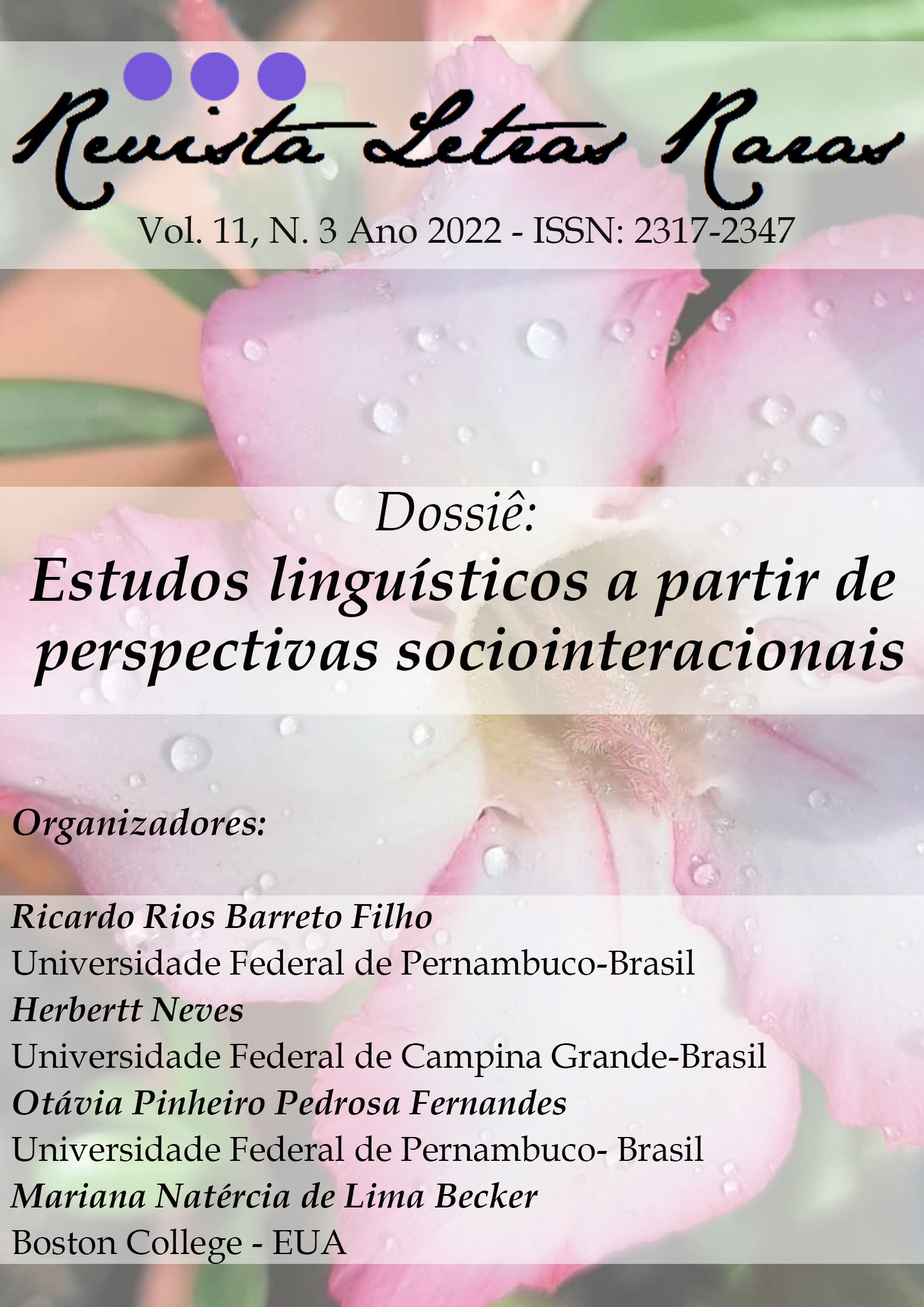Context under the bias of Sociocognition in Portuguese Language textbooks
DOI:
https://doi.org/10.5281/zenodo.8152360Palabras clave:
Context, Textbook, SociocognitionResumen
Based on the theoretical assumptions of Sociocognition, context is a (re)elaborated construction between theparticipants of an interaction based on various elements in a specific social situation that the interlocutors considerrelevant for the understanding and production of discourses (VAN DIJK, 2012). Based on this, the general objective ofthe article is to investigate the relationship that is established between context and understanding in the openingsections of the thematic units of Portuguese Language textbooks for Elementary School final years. Specifically, weintend to list the context models activated by the authors of the textbooks through the work carried out in the open ingsection of the units, in order to understand the discourse(s) that these works reveal to students on the subject of adolescents. As a methodology, we analyzed the collection Vontade de Saber Português approved by the PNLD(2014). The general results led us to consider that the analyzed collection sought to adopt strategies that tried to putan active reader on the scene in the comprehension process. Such strategies indicated the intrinsic relationshipbetween the activated context models and the process of discursive understanding about the theme worked in the unit.
Descargas
Citas
DELL`ISOLA, R. L. P. Leitura: inferências e contexto sociocultural. Belo Horizonte: Formato Editorial, 2001.
FALCONE, F. Discurso e Cognição. Eutomia: Revista de Literatura e Linguística. 2012. p.264-284. Disponível em: http://www.revistaeutomia.com.br/v2/wp-content/uploads/2012/08/Discurso-e-cogni%C3%A7%C3%A3o_p.264-2841.pdf Acesso em 10 de dez. de 2013.
JURADO, S. G. de O. G. 2003. Leitura e letramento escolar no ensino médio: um estudo exploratório. 175f. Dissertação (Mestrado em Linguística Aplicada e Estudos da Linguagem). Pontifícia Universidade Católica de São Paulo. São Paulo, 2003.
KOCH, I; ELIAS, V. M. Ler e compreender: os sentidos do texto. 3. ed. São Paulo: Contexto, 2013.
KOCH, I; CUNHA-LIMA, M. L. Do Cognitivismo ao Sociognitivismo. In. MUSSALIN, F.; BENTES, A. C. (Org). Introdução à Linguística: fundamentos epistemológicos, vol.3, 2.ed. São Paulo: Cortez. 2005. p. 251-300.
KOCH, I; BENTES, A. C.; MORATO, E. Ainda o contexto: algumas considerações sobre as relações entre contexto, cognição e práticas sociais na obra de Teun van Dijk. ALED 11 (1), 2011, p. 79-91.
LAJOLO, M. Livro didático: um (quase) manual de usuário. Em Aberto, 1996, v. 16, no 69. p. 3-9.
LAKOFF, G. Women, fire, and dangerous things. What categories reveal about the mind. Chicago: The University of Chicago Press, 1987.
MARCUSHI, L. A. Cognição, linguagem e práticas interacionais. Rio de Janeiro: Lucerna, 2007.
MARCUSHI, L. A. Produção textual, análise de gêneros e compreensão. São Paulo: Parábola Editorial, 2008.
VAN DIJK, T. A. Conferencia 3. Estructura Discursiva y Cognición Social. In: Cuadernos. n.2, año 2. Octubre de 1994. Maestría en Lingüística. Escuela de Ciencia del Lenguaje y Literaturas. 1994, p.54-92. Disponível em: http://www.discursos.org/Art/Discurso,%20poder%20y%20cognici%F3n%20social.pdf. Acesso em: 06 jun 2014.
VAN DIJK, T. A. Algunos princípios de uma teoría del contexto. In: ALED, Revista latinoamerica de estúdios del discurso, Caracas, 2001, n. 1, v. 1, p.69-81.
VAN DIJK, T. A. Discurso e Contexto: uma abordagem sociocognitiva. Trad. ILARI, R. São Paulo: Contexto, 2012.
VYGOTSKY, L. S. A formação social da mente: o desenvolvimento dos processos psicológicos superiores. 4. ed. São Paulo: Martins Fontes, 1991.
Descargas
Publicado
Cómo citar
Número
Sección
Licencia
Derechos de autor 2023 Revista Letras Raras

Esta obra está bajo una licencia internacional Creative Commons Atribución-NoComercial 4.0.








